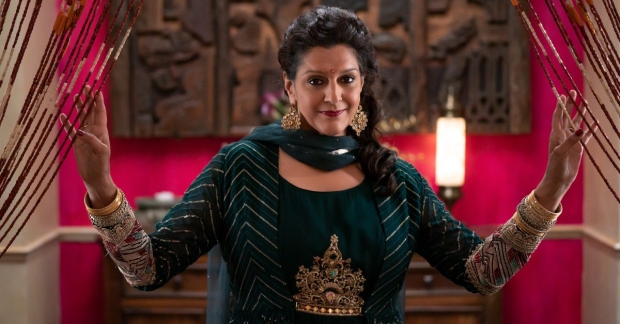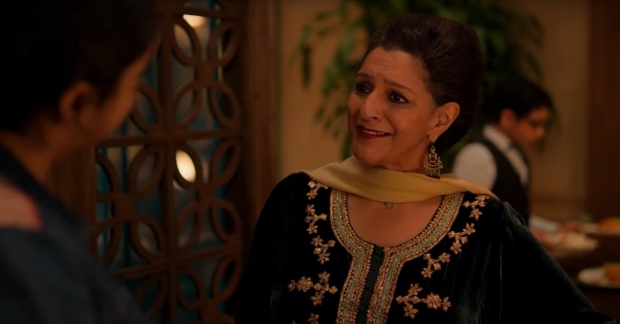Meera Syal Hopes Spin Is the First of Many South Asian Stories on Disney Channel
Syal reflects on forging her own career path, finding inspiration during COVID, and summoning her inner Barbra Streisand for her role in the latest Disney Channel Original Movie.
On Friday, August 13, Spin will make its official premiere as the latest in a long line of Disney Channel Original Movies. And as Meera Syal aptly articulates, "When you get the Disney stamp, you've arrived."
Syal – one of the UK's most versatile actors, writers, and comedians – has built a career that is a mosaic of self-made opportunities, from the sketch comedy show Goodness Gracious Me to her semiautobiographical novel Anita and Me, which she adapted and performed in onscreen. A daughter of Punjab-born parents, she found herself trying to break into an industry with few, if any, pre-worn paths. "I had to knock on those doors and I had to carve out my own voice," says Syal, "as many of the first-generation artists of color or different cultures had to do."
Being the trailblazer that she is, it's fitting that she now plays Asha, the sage and theatrical grandmother to tech-savvy teenager Rhea (played by Avantika Vandanapu). Contrary to her mathematical nature, Rhea finds a creative outlet in DJ-ing and attempts to balance this new artistic identity with her sense of duty to her single father and his family-run restaurant. Asha guides her granddaughter with both compassion and humor, as Syal says her grandmothers did for her, and as Syal has done, through her work, for rising generations – generations who now won't have to look as far as Syal did to find familiar families on television. "Someone has to be the first," she says. "I don't know what thing I am, but here I am."
This interview has been edited and condensed for clarity.

(© Disney/John Medland)
How was the character of Asha was first described to you, and what stood out to you about her?
I think when I got the breakdown it read, "She thinks she's Barbra Streisand" – which made me go, "I could play this." [laughs] I think I've spent much of my life thinking I'm Barbra Streisand. It was the glamor of her, the sass of her, but also the warmth of her that I thought, "I absolutely want to play her." These are the women I grew up with. Not the usual types you see portrayed. Women with strength and heart and dynamism. Even though they might not have had the opportunities that they should have had, they'll make damn sure that their granddaughters get them. All of that really resonated with me.
Which specific women from your life are you channeling in this movie?
Both my grandmothers were huge influences. Neither of them really had an education, but they were so extraordinary – their sacrifices that they made for the family, the epic things they went through. And yet they were still so warm and kind and loving and spent their whole life in service of other people. I guess with every generation of women you look behind and you go, "What can I take from those women before me?" Also, "What don't I want to repeat? What can I do that they didn't get the chance to do?" My daughter has probably more freedom than I had. I certainly have more freedom than my mother. So you hope you reach a stage where you're bringing the best of everything. You're bringing great things that your ancestors gave you, plus you're bringing your own modern outlook. And I think that's what Rhea does. Ultimately she fuses the best of both of her amazing cultures and produces something wonderful.
How does it feel to see such a mainstream platform like Disney Channel produce a movie that centers around an Indian family?
It's pretty huge, actually. I feel like when you get the Disney stamp, you've arrived. And quite rightly. We're a significant part of the world's population, but also we have a culture that is so extraordinary on so many levels. We take our culture with us wherever we go. It doesn't get erased. And we've obviously seen many other South Asian artists now emerging in the States, and we've had it in Britain. It just felt absolutely the right time. What I really like about what Disney has done is that they haven't jumped straight in with a cultural clash story, which is the very obvious way to go. They've gone in with this story that's utterly universal, but Rhea happens to come from an Indian family. The fact she has to struggle with trying to do her music is not because she's Indian. It's because she has a sense of duty. I love all the subtlety of that. I think for their first project they've done it really well and I hope it's the first of many.
Rhea's story is largely about her exploring her own creativity and coming into her identity as an artist. Do you remember when you started exploring your creativity? Who supported you in that?
Oh gosh, I think I started pretty early. I started writing little plays and things in my teens and kept a diary, which now I realize is why I started writing. And I badgered and badgered my parents to try and find me drama classes— which, you know, for an Indian kid in the '70s in Britain was just like, What are you talking about? There was nobody like me on television, or in film. I had no role models. Because Bollywood films are Bollywood films. That's over in India. It's not what we see here. And that was quite true. And if you don't see it, you can't be it. So I ended up doing English and drama at university, and my parents fantastically allowed me to do that. Because my dad was quite artistic. He was a wonderful singer. He'd been offered a film contract when he was a boy and his dad hadn't let him do it — because he said films were bourgeois and not worth the time. [laughs] I always think when the time came for me, he thought, you know what, I didn't get my chance, but I'm going to let my daughter spread her wings.
One of my favorite scenes in the movie is when Rhea confides in you that she's worried she's out of creative ideas. What do you do when you feel out of creativity?
We've all faced that horrible blank page. It's stories. People's stories. There's nothing more inspirational. So when I'm feeling blocked, I shamelessly tend to hang out with my mom and her friends or my aunties, because you get them talking and you come away with 100 different ideas. Nobody thinks old Indian women are important so they're not telling those stories, so you kind of feel a duty that you have to remember them.

(© Disney)
Did your family help spark any creativity during the doldrums of quarantine?
Actually, my mom lives with us and we finally recorded her telling her life story. We thought there was no better opportunity. So that was the first creative thing we did [during the pandemic]. My daughter and I did it together and it was such a great thing to do. I have to say, I think the first few weeks — the first maybe couple of months [of quarantine], I didn't feel like doing anything. I was in shock. We were all just in shock. And then that sort of unblocked it really, because then you think, creativity comes in all different forms. For me that was a very creative thing to do. It might have been unpaid and no one else is seeing it, but it fed my soul. And it's history that we've now got down. I think the pandemic made people be creative in different ways, which was a really good thing.
You have one big dance scene in Spin that is a joy to watch. How did it feel to film?
I got through it. [laughs] I'm not a natural dancer. I have amazing choreographers, and our wonderful director Manjari [Makijany] is from India and is well-versed in all kinds of Bollywood stuff, so I knew she'd shoot it well. Manjari quite rightly said, "It's more important that you feel it and you play it rather than you're absolutely step perfect." And of course, that's who Asha is. She's Barbra Streisand!







